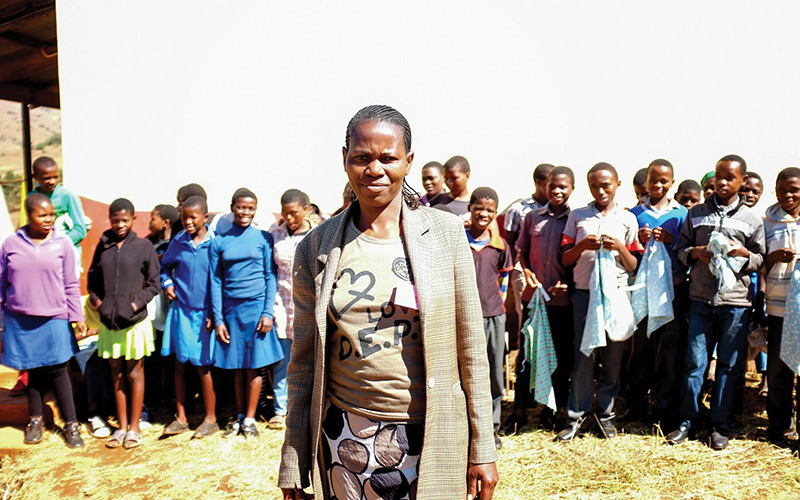Weeping Turned to Dancing
God’s Word offers hope in the midst of Swaziland’s AIDS epidemic.

Bible-based Trauma Healing enables Swazi people to express long-suppressed grief and hurt. The sessions foster fellowship through sharing, artistic expression and dance. Photo credits: Adam Garff.
In the foothills of Swaziland, a small country in Southern Africa, Sophie* shuffled into a cement classroom and found a seat on the dirt floor. As men and women filed into the room, she smiled, flashing an ear-to-ear grin.
But beneath her smile, Sophie carried deep wounds—both emotional and physical. Like more than 380,000 adults in Swaziland, Sophie lives with HIV. Friends and family members abandoned Sophie when she contracted the virus, leaving the young mother feeling rejected and worthless.
In search of peace and acceptance, Sophie joined a group of Swazi men and women for a Bible-based Trauma Healing session, led by Harriet Hill, director of American Bible Society’s Trauma Healing program. For the past 15 years, Hill has facilitated Trauma Healing sessions around the world, serving people who live with abuse, violence and injustice. During these sessions, Hill equips trauma survivors to voice their pain, forgive their oppressors and find hope and healing through God’s Word.
In Swaziland, Hill first urged attendees to publicly share their heartache, empowering them to find freedom from emotional suffering. But for these participants in Swaziland, the process directly opposed a long-standing cultural norm of concealing their pain.
“People have to deal with [loss] at such a fast pace,” says Sphiwe Ngwenya, general secretary of Bible Society of Swaziland. “One day they’re burying one person, the next day they’re burying another. There’s no time to sit and address these things, no time to grieve.”
To help attendees voice their hurt—and find time to grieve—Hill encouraged the Swazi participants to draw pictures of brutal assaults, write laments about painful experiences and dance while reading Scripture. In fellowship with others, the Swazi people found space to grieve.
Hill then gathered the group to share the healing power of forgiveness. Drawing from God’s Word, she explained the danger of falling victim to resentment—of refusing to forgive those who judge, reject and discriminate against people who live with HIV.
“Being a slave to bitterness and anger will destroy you,” Hill told the group. “Not being able to forgive those who have hurt you is destructive. We forgive for our own sake—so we can heal.”
During the final stage of the program, Hill equipped attendees to relinquish their pain by bringing their suffering to Jesus.
“Bringing our pain to the cross is an act of worship,” explains Jane Jelgerhuis, managing director of American Bible Society’s worldwide Trauma Healing ministry. “The cross is the ultimate symbol of Christ’s sacrifice for us and his infinite care for our souls.”
“We forgive for our own sake so we can heal.”
While walking attendees through this culminating exercise, Hill encouraged participants, including Sophie, to write down their darkest memories. And then, one by one, she invited the men and women to drop their memories into a small fire that burned beside a large wooden cross at the front of the room.
After marching past her peers, Sophie stood over the fire and tossed her hand-written memories into the pit, watching as her paper wilted in the flames. She thought about her past—how she once contemplated suicide as an escape from her suffering. And then she watched her pain float away in a small stream of smoke.
Now equipped with the life-changing message of God’s Word—and experiencing the freedom found in Jesus Christ—Sophie has reason to flash an authentic, ear-to-ear grin.
You can help share God’s Word with those who need it most!
Visit ABSRecord.com/GiveBibles.
Thanks to the support of our faithful financial partners, American Bible Society has been engaging people with the life-changing message of God’s Word for more than 200 years.
Help us share God's Word where needed most.
Sign up to stay in touch with how God is changing lives with his Word!








